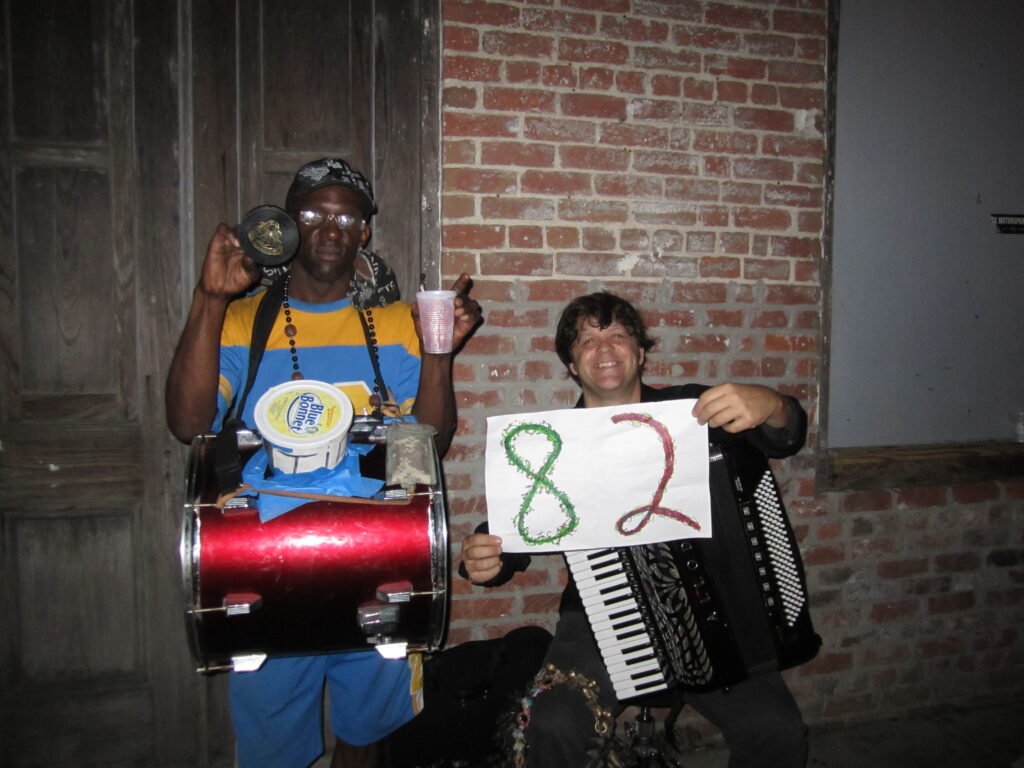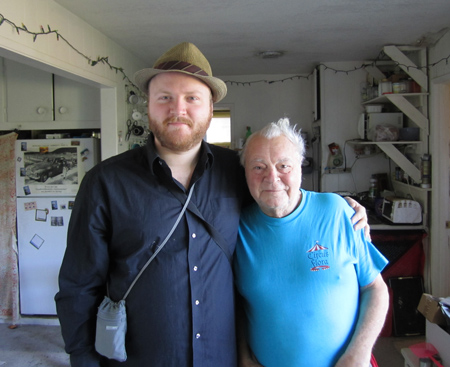
The Column of Lasting Insignificance: July 2, 2011
John Wilcock
THE WANDERING MINSTREL came to town for a day or two and as usual, found eager audiences. “I started with a simple criterion for the daily gig,” explains Michael Ward-Bergeman, “at least one person, for at least 35 minutes. Some gigs have indeed been intimate, but if you average it out up to this point, I have played for between 50-75 people a day for about an hour. I have not missed one day of performance so far this year.”

Michael’s chosen instrument is the accordion — although he has many others — and what brought him to Ojai was the annual Music Festival where he rejoined his old colleagues, the soprano Dawn Upshaw, who directed this year’s festival, and the intriguingly-named group Eighth Blackbird (there are six of them).
But in addition to the scheduled performance, he finds his audiences at random. “I usually don’t contact anyone. I have about 150 gigs set up in advance this year and for the rest, I just show up at different places that I think might be receptive to a musical experience and ask if they would like me to perform on that day. It could be a cafe, hospital, gallery, anywhere really; the 150 gigs determine my general direction, and where I need to be at certain times. I’ve been lucky this year as the timing has worked out well, taking me all over the USA and parts of Europe.”
His music-making has taken him to many beautiful places around the world: Hong Kong, Copenhagen, Courchevel, Madrid, and Caracas, for example, which is where he began what he terms Gig 365.
“I became curious about what would happen if I was to share music-making in a wide variety of traditional and non-traditional venues for an entire year. I began to wonder about what it would be like to perform every day. Would a momentum develop? Would I be able to gather and use the energy in a meaningful way for people that shared music-making with me along the way? Would I discover something new about music, about myself, about others? It became clear that 2011 was the time to do it.
“I started in Venezuela because my girlfriend Yulene is from there, and it was where we planned to be together for the holidays in 2010. We went down mid-December and started setting up gigs, which was difficult as the country more or less shuts down around the holidays. But it magically came together — a sign of things to come!”
MICHAEL’S FRIEND and traveling companion, Oscar Cainer comments: “The beauty of this project is the way in which music is its sole currency. The ability to offer music for free has opened up an entire world of emotional exchanges that would not necessarily have been possible were there financial constraints.

“I’ve been traveling with Michael for significant bursts of time every other month on average — I was there at the beginning in the shrines, orphanages, and care homes of Venezuela and at the coffee shops, rock clubs, and homeless centers in Florida. I was tagging along at the gleaming concert halls of Madrid and Copenhagen and I was driving him around between village hall, folk club, church, and boatyard across the UK and France.
“I’ve been party to swamp music from Louisiana, cowboy music from South America, blues music from the South of America, gypsy music from Europe, folk music from England, classical music from Argentina, and tribal drumming from Tibet, all through the work of one man’s arm.
Invented in Europe in the 1830s, the accordion is one of several instruments played by compressing or expanding a bellows which allows air to flow across strips of brass or steel (reeds) that vibrate. As it needs no accompanying instrument, it is considered a one-man band and plays a major part in the folk music of Europe and both North and South America.
In the compact white truck in which the pair travel, is a large array of instruments, including accordion and dozens of percussion instruments, (“some of which my dad and I built specifically for this tour”); a stage, speaker system, and a 6′ x 4′ light board that folds in half (500 multi-colored Xmas tree lights through random holes poked through painted black paneling). There’s a suitcase with clothes, a tent, tarp, blankets, pillows. other small stuff to fix things (tape, wire, pins, glue) flashlights…etc. I have a few pictures.
“I also bought a rather expensive, bulky generator to power my entire sound system and light rig in the event of no electricity. I’ve only used it once, and hope there is a call for it in the near future.
Not limiting his attention to concert halls and stages, Michael has always regarded music as therapy. “I’ve been using music as a therapeutic tool since I was very young when I became involved with its importance. I would guess that music is therapy in any environment and I use it as a tool to reach patients in a clinical environment and establish a resonance with them. This sometimes gives them an opportunity to temporarily transcend any disability they might be experiencing and learn something new about themselves and/or the universe and communicate about it. Other times, it triggers memories and brings them back in time, and they are able to sing, laugh, and/or cry, which normally might be very difficult. Sometimes I use it to assist in relaxation.
Oscar had some comments about this. “The expression of joy that was communicated in a grateful smile from a previously abused care home resident in Venezuela will stay with me for life,” he recalled. “ The tragedy of playing a centre for the children of homeless parents in Orlando, with all their youthful exuberance and boisterousness, despite the impossible difficulties they must face, surrounded by streets full of vagrants queuing for food to be handed out from the trunks of cars, in a city famous for Disney World, is another experience that moved me fundamentally.
Where will the wandering minstrel find himself next?
“The magic of GIG 365 is that I have a certain amount of gigs booked, and that points the direction in which I travel,” Michael says. “But the rest of the gigs happen as I go, and I sometimes find myself going around on the day of a gig playing for people to see if there is interest to have me perform later in the day. I’ve met a lot of great people this way.
“I finally made it to New Orleans in March after years of people telling me I should go. I knew I had found a spiritual home on my first day there. The musical language and culture there runs deep and overflows out onto the street. I played on numerous street corners around the city, mostly in the French Quarter.
‘If a passing musician hears you and likes what you are doing, they will stop and play with you. I was fortunate enough to play with some folks that have been playing on the streets since they were children — they always seemed to find me, wherever I was.
WHATEVER INFLUENCE he might have had on the world at large, he’s certainly changed the life of his companion.
“I’ve had moments that have changed me spiritually and informed me factually,” says Oscar. I’ve been treated like family by Michael’s family and been greeted as a friend by his friends. They all recognize the same thing in him as I do and therefore need no explanation as to why I am there. Michael is unique in spirit, fascinating in character, and compelling as a performer; it’s obvious to them why I would be choosing to document this journey and they are all more accommodating than I should have the right to expect.
“The variety of settings adds visual interest but it is the human reactions and interactions which have delighted and moved me most of all. It is through the experiences I’ve had with Michael in the small time I’ve been with him that I have begun to more understand my spiritual and cultural place in the world. I’ve started volunteering at a local drop-in centre for the homeless in London and I’m making what I hope to be my opus in the documenting of this project. When I started this I was expecting to document how these experiences would affect and change Michael. What I was not prepared for was the transformative effect it would have on myself.”
